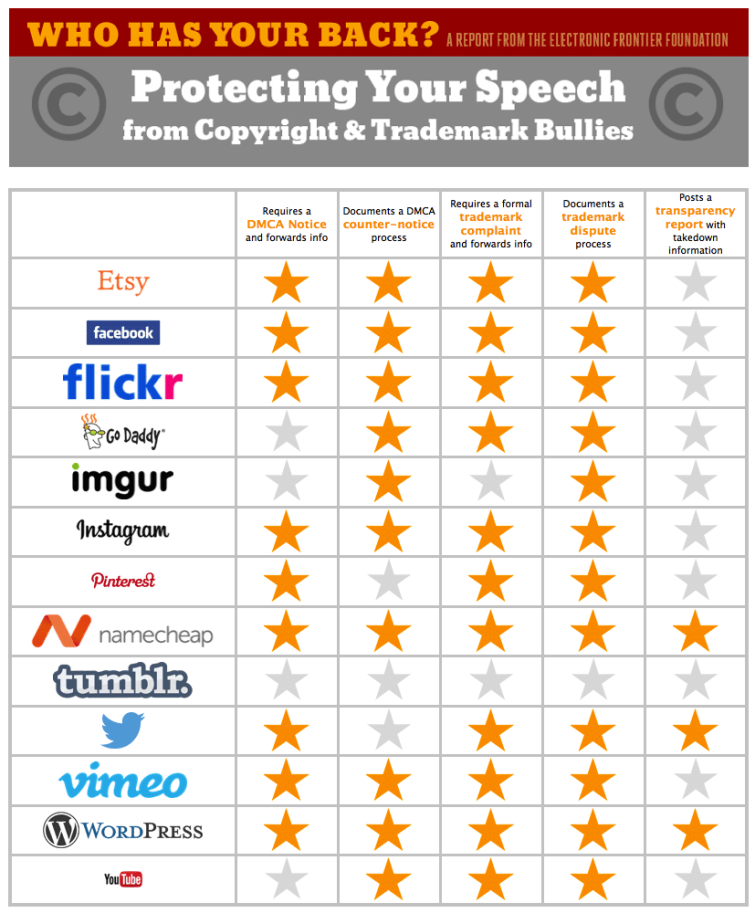- Aug 31, 2014
- 171
Which companies protect against copyright bullies?
29 Oct 2014 | Douglas Crawford
Back in April this year we reported on the Electronic Frontier Foundation (EFF)’s ‘Who has your Back? Protecting Your Data from Government Requests’ 2014 report, in which it assessed major tech companies based a set of criteria on how much they protected customers from intrusive government requests for their data.
Despite leaving us rather surprised that companies such as Google, Microsoft and Facebook, who have all been heavily implicated in helping the NSA with its PRISMblanket surveillance program, received a full house of six stars, the report did a good job of highlighting the measures companies take to resist government demands.
The EFF has now published another report in the series – ‘When Copyright and Trademark Bullies Threaten Free Speech’. EFF Director of Copyright Activism, Parker Higgins, explains,
‘When a private citizen or corporation wants to silence speech on a major online platform, the quickest method is often a copyright or trademark complaint. EFF has worked for many years to help people whose speech is unfairly targeted by these sorts of complaints, and we’ve seen how important it is that speech platforms have policies that help protect lawful users.’

The report examines 13 companies, and awards them stars based on whether they conform to ‘baseline standards’ in defending users’ speech against copyright and trademark bullies. A fairly lengthy executive summary of the report is available here, and the full 12 page report can be downloaded here (.pdf).
The only companies in the list to score a full house of five stars are WordPress andNameCheap (a US based domain registrar), so hats off to them, while Tumblr wins the booby prize for doing the least to protect its customers.
The report does however give credit to Etsy and Twitter who while both dropping a star, did take additional measures to protect their clients (Etsy provides educational guidelines, while Twitter publishes regular transparency reports). In fact, the lack of adequate transparency reports proved to be the most common problem across the board.
EFF Intellectual Property Director Corynne McSherry, says of the report,
‘Major online platforms are essential to online expression, so their policy decisions can have a huge impact on public discourse. As users choose which platforms will host their updates, writing, images, and videos, they ought to know which of these services have publicly committed to treating their speech fairly and even helping them fight back against bullies that would try to take it down.’
29 Oct 2014 | Douglas Crawford
Back in April this year we reported on the Electronic Frontier Foundation (EFF)’s ‘Who has your Back? Protecting Your Data from Government Requests’ 2014 report, in which it assessed major tech companies based a set of criteria on how much they protected customers from intrusive government requests for their data.
Despite leaving us rather surprised that companies such as Google, Microsoft and Facebook, who have all been heavily implicated in helping the NSA with its PRISMblanket surveillance program, received a full house of six stars, the report did a good job of highlighting the measures companies take to resist government demands.
The EFF has now published another report in the series – ‘When Copyright and Trademark Bullies Threaten Free Speech’. EFF Director of Copyright Activism, Parker Higgins, explains,
‘When a private citizen or corporation wants to silence speech on a major online platform, the quickest method is often a copyright or trademark complaint. EFF has worked for many years to help people whose speech is unfairly targeted by these sorts of complaints, and we’ve seen how important it is that speech platforms have policies that help protect lawful users.’

The report examines 13 companies, and awards them stars based on whether they conform to ‘baseline standards’ in defending users’ speech against copyright and trademark bullies. A fairly lengthy executive summary of the report is available here, and the full 12 page report can be downloaded here (.pdf).
The only companies in the list to score a full house of five stars are WordPress andNameCheap (a US based domain registrar), so hats off to them, while Tumblr wins the booby prize for doing the least to protect its customers.
The report does however give credit to Etsy and Twitter who while both dropping a star, did take additional measures to protect their clients (Etsy provides educational guidelines, while Twitter publishes regular transparency reports). In fact, the lack of adequate transparency reports proved to be the most common problem across the board.
EFF Intellectual Property Director Corynne McSherry, says of the report,
‘Major online platforms are essential to online expression, so their policy decisions can have a huge impact on public discourse. As users choose which platforms will host their updates, writing, images, and videos, they ought to know which of these services have publicly committed to treating their speech fairly and even helping them fight back against bullies that would try to take it down.’
